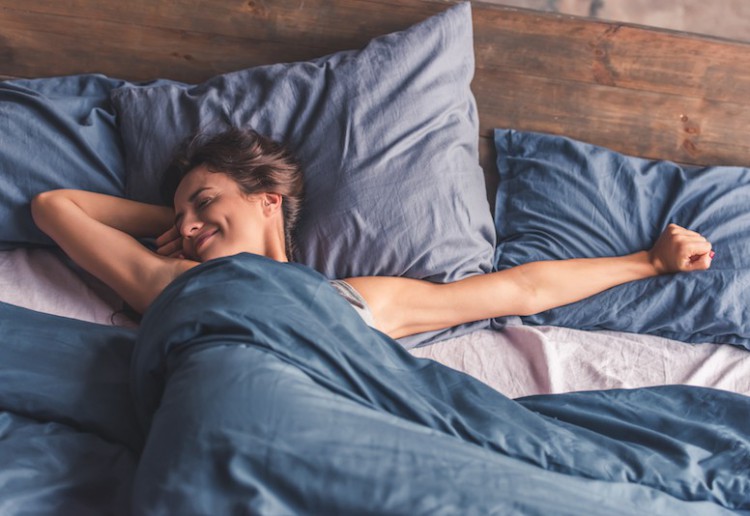Constantly tired but can’t sleep? You’re not alone.
Feeling tired but wired is the new norm for many people in our 24/7 world of hyper-stimulation. We are addicted to activity and productivity, and even when the body wants to rest, the mind is often a whirlwind of thoughts and worries that won’t allow it.
According to the Sleep Health Foundation, around 1 in 3 people experience sleeplessness – when a person regularly finds it hard to fall asleep or stay asleep. Not all sleeplessness is due to stress, but people who experience stress often experience sleepless nights.
One survey reported that 25% of Australian adults experience stress in any given 12-month period, and this rises to 54% for sleep-deprived sufferers.
So how can you help calm the mental whirlwind and experience restorative, restful sleep naturally?
Mindfulness meditation
This is one of the most powerful tools for improving your sleep, according to research.
It involves focusing on your breathing or a particular sound or word, e.g. “Om”. It is a practice in bringing your mind’s attention to the present without drifting into concerns about the past or future – the thoughts that can cause stress.
The goal is to break the train of your everyday thoughts to evoke the relaxation response – the opposite reaction to the fight or flight stress response. Each time your thoughts stray; bring your attention back to the present by focusing on your breath or your chosen sound.
Practice daily for 20 minutes before bed.
Ditch your phone
If you use your smart phone before bed every night, it may be sapping you of restful sleep and studies have shown it can reduce daily engagement in work.
The blue light emitted by screens on digital devices can suppress the production of melatonin – the hormone that controls your sleep-wake cycle – and may keep your brain alert by keeping your mind engaged.
Give yourself at least 30 minutes of gadget-free transition time before going to bed.
Move more
Exercise and other physical activity produce endorphins—chemicals in the brain that act as natural painkillers—and also improve the ability to sleep, which in turn reduces stress . The World Health Organisation recommends that adults 18-64yrs should do at least 150 minutes of moderate-intensity activity per week to profit from the stress buffering and health-promoting effects of exercise.
Try some herbal relief
Prefer to try something natural?
ReDormin Forte is a well-tolerated, natural medicine that has been clinically researched for over 10 years. It contains a specific combination of herbal extracts, referred to as Ze 91019, which has been shown to help restore healthy sleep patterns within two weeks.
Studies suggest it works by acting on adenosine and melatonin pathways to help reduce the time taken to get to sleep and help re-establish healthy circadian rhythms – or our body clocks. It can help you spend more time in the deep, restorative sleep stages and wake feeling more rested and refreshed.
Limit caffeine
Caffeine, with its stimulant effects, is disruptive to good sleep. And these days, with the popularity of energy drinks and other caffeine-laden drinks and snacks, it’s not difficult to wind up consuming caffeine throughout the day, even if you’ve set your coffee cup aside.
Try to avoid having caffeine after lunchtime. Research has shown that caffeine consumed even six hours before bedtime resulted in significantly diminished sleep quality and sleep quantity.
Keep a nightly to-do list
We all have thoughts cycling through our head during the day…and some of them continue to whirl even when it’s time for shut-eye.
Taking five minutes to write a to-do list before going to bed (as opposed to writing a list of things you have accomplished) can help decrease the worry cycle, according to recent research. There’s something about the act of physically writing on paper that tends to offload it a bit, or help us hit the pause button. It may encourage a decrease in mental stimulation as well as rumination and worry, potentially helping you to fall asleep more easily.
Always read the label. Use only as directed. If symptoms persist consult your healthcare professional.





















-

-
-
-
Ellen said
- 10 Feb 2019

Reply
-

-
-
-
curlytops said
- 07 Jan 2019
Reply
-

-
-
-
mom206279 said
- 31 Dec 2018
Reply
Post a comment7:40 am
8:33 pm
10:14 pm